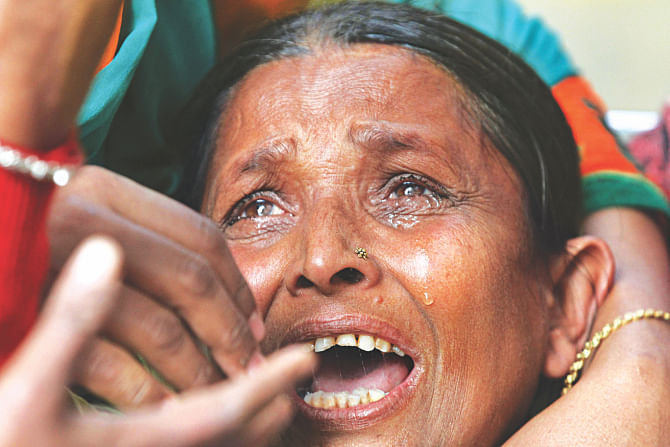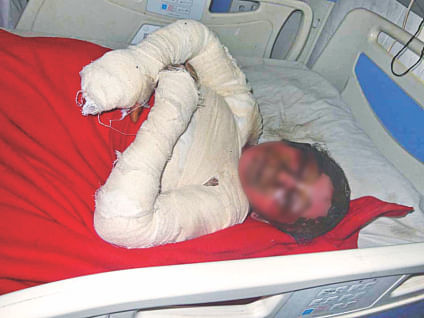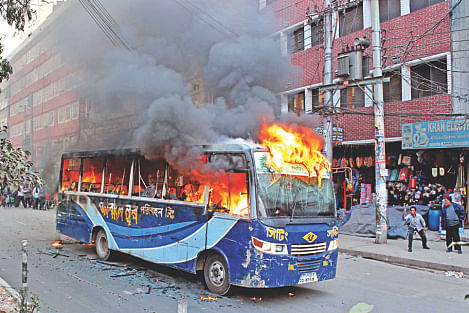Break away from this destructive cycle

People can well remember that the country sustained huge losses in terms of lives and properties during 2013 shutdowns and blockades. According to Centre for Policy Dialogue (CPD), the losses during the last six months of that year stood at Tk. 50,000 crore. Happily, as 2014 was somewhat peaceful, the business community could make up that loss to a great extent. But with call for indefinite blockade 2015 heralded gloom for the country from the beginning of January. Seldom in the past has this country faced so ominous and bleak a situation as it is facing now. Other than 22 innocent lives lost so far and hundreds of buses and trucks damaged, the all-out blockade during the last nine days has cost the economy several thousand crores of taka with daily count of one thousand and six hundred crore taka as reported by the DCCI.
The blockade call by the BNP and its allies since January 4 has sent shockwaves throughout the country. Panic stricken office goers and factory workers cannot go to their work, traders cannot run their business, buses, trucks, and trains cannot move for fear of bomb attack, and most disquietingly, children cannot attend schools for fear of street violence.

Parvez, a day labourer, was on his way to Ramganj from Gaibandha when his coach was attacked by petrol bomb. He was run over by a truck when he tried to save himself by jumping down from the burning bus. Murad, a bus helper, was sleeping in a parked bus in Jessore town. The bus was torched before he could come out. He later succumbed to his injury. Now, will the feuding parties think for a moment as to what will happen to their or other victims' families? Why are these innocent and uninvolved persons becoming victims in a clash of the Titans? The irony is that these people voted the politicians to power but have now turned victims of this dirty power struggle!
Belying all expectations of a settlement, our politics is headed towards an ominous and chaotic turn that spells disaster. Because of poverty, corruption and non-governance during the last few years, the country witnessed a disastrous upsurge of violence that cost hundreds of lives, a steady worsening of the economy and an unprecedented polarisation of the society. People have a feeling that democratic norm is rapidly losing its grip on the society at large, regardless of which party is in power. Liberal minded people are wary of the dangerous consequences of hatred, animosity and intolerance in the political circles on one side and downward slide of economy and business on the other side. Since most people are mute spectators in this dangerous game of power politics, suffering in silent pain and agony, and do not have any space to ventilate their grievances, politics, perhaps in its worst form, has gained free ground for many whose vision does not extend beyond their personal gains.
People did not know that the taste of democracy could be so bitter! The country has hardly faced such a daunting situation since liberation. People thought that 'politics is an art of compromise,' but now they see that it is a violent game of self-annihilation, and in its worst form, destruction of the country. The battle now is not for restoration of democracy but a way to go to power or to stay in power, by means mostly foul. What is most alarming is that allegedly radical Jamaat cadres are now killing people without any pricking of conscience. It is no surprise to the people that weapons like pistols and bombs bristle in the countryside like swamp mosquitoes, almost as a deadly plague.

The general people are worried by increasing threats to their lives and profession by the growing menace of violence. But shockingly, this has never crossed the mind of our leaders who are only fighting for policies, ideology and power and not for anything related to alleviation of people's sufferings.
But people no longer want to listen to lip-service by the administration: they want security of their lives, properties and freedom of movement. So they are pleading for a “dialogue” to restart among feuding political party leaders through non-political intermediaries acceptable to both the parties in the midst of an increasingly serious economic slowdown and unprecedented violence.
People still believe that the country's dreadful torment could possibly be averted if eminent citizens could come out on the street and raise their voice against this anarchic situation. Without further delay, the country must be brought back on track, and this can only be done by a fair display of sanity and political leadership.
At the moment, the ruling party and the opposition BNP and its allies are caught in a crisis of unusual dimensions with the possibility of either revitalising themselves or hastening their doom. To regenerate the nation's confidence, the administration has to act most cautiously and expeditiously, and the actions must be backed by rational considerations, welfare of the masses and a look to the future.
The stakes are too high to leave the contentious issues unresolved. No one in the country would be immune to the pain in this all-out conflict. Worse, aggravated by self-aggrandisement, personal interest and hardening extremist lines that seem to be a fashion of the day, party feuding could wreak havoc far beyond the party interests. People are now prompted to say what the chaos in the aftermath of the Liberation War could not destroy, democracy did. With consequences so dire, the burden that the ruling party must carry is too heavy for it. If it should falter again, the consequences will only reverberate.
The writer is a columnist of The Daily Star.
E-mail: [email protected]

 For all latest news, follow The Daily Star's Google News channel.
For all latest news, follow The Daily Star's Google News channel. 




Comments